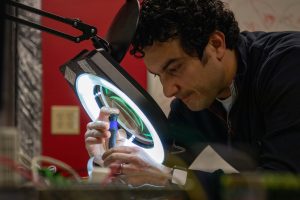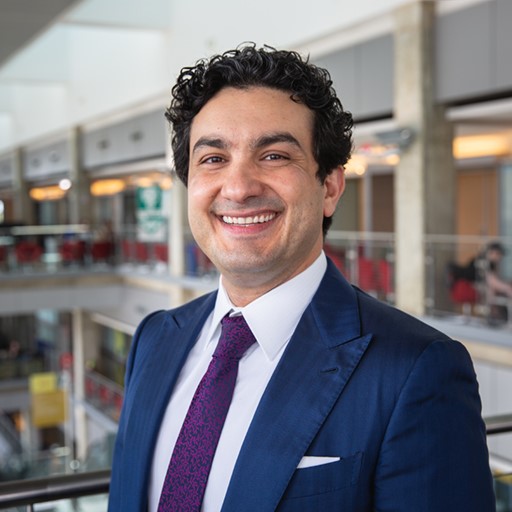Amrou Awaysheh (Kelley)
Sustainable Operations Concepts and Tools for the SDGs
Dr. Amrou Awaysheh is an Assistant Professor of operations and supply management at the Kelley School of Business at IU Indianapolis and the Founder and Executive Director of the IU Business Sustainability Lab. A strong advocate of the UN’s Sustainable Development Goals (SDGs), Dr. Awaysheh studies and teaches on the principles and practices of sustainability in business operations.
His academic work in the discipline of business focuses on how firms leverage and understand their data, enhancing their operations and supply chains to improve their financial performance. Combining his knowledge of business operations and his drive for environmental preservation and a sustainable future, Dr. Awaysheh also looks at how firms integrate and manage socially responsible practices in their operations and supply chains to enhance profitability and improve firm valuations. Situated between the three core dimensions sustainable development – the economic, social, and environmental – much of Dr. Awaysheh’s research looks at what companies can do beyond basic philanthropy to help improve their impact on the environment and society, while continuing to make a profit. Through his efforts, Dr. Awaysheh is demonstrating to students and partnering business that organizations can harness the 17 SDGs to drive economic and job growth, minimize environmental risk and destruction, attract investment, and forge a better future for all.
If we are to meet the challenges and opportunities for a more just and sustainable future, businesses must play a major role. Dr. Awaysheh is demonstrating this through his Business Sustainability Lab by guiding businesses to embrace sustainable practices for environmental preservation and economic growth. The Lab focuses on developing sustainable strategies and technologies to help manufacturers better understand energy consumption and work on ways to lessen this consumption while still leveraging their competitive advantage.
Dr. Awaysheh also leads the IU Energy Efficiency Lab and is a Research Fellow at the Center for Excellence in Manufacturing at the Kelley School of Business. He is part of a multidisciplinary, multi-institution team that received a $70 million grant from the U.S. Department of Energy to advance the use of secure and energy-efficient technology in manufacturing.
Since 2008, Dr. Awaysheh has managed and participated on over 60 global corporate social responsibility initiatives with Fortune 500 firms. The cumulative impact of these projects has resulted in savings of over $1.73 billion and revenue increases of over $960 million. Combined, these projects directed approximately $380 million of investments. All of this in the name of sustainability, while encouraging and embracing the basic principles of economic, social, and environmental justice found throughout the 17 SDGs.
 The Business Sustainability Lab
The Business Sustainability Lab
Through the Business Sustainability Lab, Dr. Awaysheh works with companies to help enhance their sustainability and financial performance. This work has identified the substantial financial benefit that firms can reap by focusing largely on reducing resource consumption, such as energy and water, and eliminating waste generation within their operations.
Founded in 2021, the IU Business Sustainability Lab offers years of research and on-the-ground business experience to firms seeking sustainability strategies. By turning these practices into specific, operational improvements, the lab allows companies to examine, understand, and leverage these strategies to their competitive advantage.
Read more on the Business Sustainability Lab
The 17 SDGs present the most urgent calls to action are for achieving a more just and sustainable future, while providing Dr. Awaysheh, his business-leading partners, students, and all of us with a universal and visionary framework for accomplishing these goals. Many of the targets within these goals encourage sustainable practices, many of which have been adopted by global companies, and the Business Sustainability Lab is working to further the embrace of these ideals and behaviors. The UN SDGs directly related to the sustainable practices encouraged by the Business Sustainability Lab include SDG 6 (Clean Water & Sanitation), SDG 7 (Affordable & Clean Energy), SDG 8 (Economic Growth & Good Jobs), SDG 9 (Industry, Innovation, & Infrastructure), SDG 10 (Reduce Inequalities), and SDG 12 (Responsible Consumption & Production). In addition to strides made in achieving these goals, the Lab and Dr. Awaysheh’s work visibly embraces SDG 17 (Partnerships for the Goals), demonstrated in the many business, nonprofit, and community partnerships shared within the Lab and Dr. Awaysheh’s endeavors. Read more about how the Business Sustainability Lab is working to achieve these and other SDGs here.
Since 2008, sustainability projects led by Dr. Awaysheh have had a measurable impact on the natural environment.
Through partnerships and consultation, the Business Sustainability Lab is proving the value add of sustainability.
Teaching Sustainable Operations
Since the Summer of 2020, Dr. Awaysheh led a Sustainable Operations course for MBA students at the IU Kelley School of Business. The course looked at how business models and operations can change to become more sustainable – encouraging an understanding of sustainable development and corporate social responsibility. The course stressed the significance of businesses accepting the importance of environmental preservation and sustainability and explained how can discover the financial benefit of maximizing their environmental and social performances. Using the theory of the Triple Bottom Line (TBL), students learned how businesses and business leaders can examine sustainable development and corporate social responsibility and discover the beneficial trade-offs and balances of incorporating environmental, social, and financial sustainability principles and practices. This course is groundbreaking in its acceptance and engagement with the 17 SDGs, namely SDG 8 (Decent Work & Economic Growth), SDG 9 (Industry, Innovation, & Infrastructure), and SDG 12 (Responsible Consumption & Production) – and, through its education of MBA students, SDG 4 (Quality Education).


